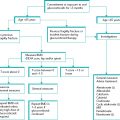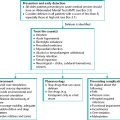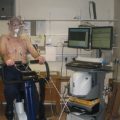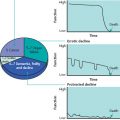Introduction
The risk of developing dementia rises with increasing age (see Table 8.1). An ageing population means that dementia is on the increase. This should allow planners and politicians to forecast needs and hopefully to develop services. In the UK there are currently over 750 000 people with dementia. This is projected to rise to over 850 000 by 2010 and 1.8 million by 2050. Because of its economic impact, dementia is an important target for diagnostic and therapeutic research and development. To the clinician it presents a challenge in accurate differential diagnosis and management, and is also a factor in managing other illnesses in older people.
Definitions
Dementia is defined as an acquired, global and progressive impairment of mental function. Being acquired distinguishes it from learning disability, being global distinguishes it from focal disorders such as stroke or Parkinson’s disease (though both of these can result in dementia) and being progressive distinguishes it from nonprogressive impairment, for example following trauma, or reversible impairment in delirium.
Dementia can also be defined as a syndrome due to disease of the brain, usually of a chronic or progressive nature in which there is, in the absence of clouding of consciousness, disturbance of multiple higher cognitive functions (Box 8.1).
Table 8.1 Prevalence of dementia by age. From Jorm AF, Korten AE, Henderson AS. The prevalence of dementia: a quantitative integration of the literature. Acta Psychiatrica Scandinavica 1987; 76: 465–79.
| Age (years) | Prevalence (%) |
| <65 | Rare |
| 65–69 | 1.4 |
| 70–74 | 2.8 |
| 75–79 | 5.6 |
| 80–84 | 11.1 |
| >85 | 23.6 |
Box 8.1 Higher cognitive functions disturbed in dementia
- Memory
- Thinking
- Orientation
- Comprehension
- Calculation
- Learning capacity
- Language
- Judgement
Types of dementia
Dementia is a syndrome with a variety of causes (Table 8.2). Of these causes, Alzheimer’s disease is the most common, followed by various types of vascular dementia (which have the same risk factors as stroke – see Chapter 7) and dementia with Lewy bodies (DLB). The metabolic ’dementias’, although rare, are important because of their potential reversibility (e.g. hypothyroidism). Other causes of dementia are also rare and usually manifest at a younger age. There are some rare genetic variants of Alzheimer’s disease with early onset and increased familial risk. Early-onset Alzheimer’s is also a feature of Down’s syndrome.
Symptoms and differential diagnosis
Deficiencies in memory, orientation, judgement, comprehension and learning (especially in new situations) are the most common presenting symptoms of dementia. The term ’confusion’ is often used by relatives or doctors but is imprecise and should be clarified, or avoided. Cognitive testing will often reveal deficiencies in these and other areas. The Mini Mental State Examination (MMSE) accesses a variety of these areas (orientation, registration, attention, calculation, recall and language) and gives a rough indication of severity (see further resources section). However, poor intelligence and education, or acute illness causing delirium, are factors that can affect the result.
Table 8.2 Different types of dementia.
| Type of dementia | Approximate % of cases |
| Alzheimer’s disease | 55% (includes a considerable number of mixed Alzheimer–vascular cases) |
| Vascular dementia (subtypes: acute onset, multi-infarct, subcortical) | 20% |
| Dementia with Lewy bodies (DLB) | 15% |
| Frontotemporal dementia syndromes (e.g. Pick’s disease) | 5% |
| Other dementias (e.g. metabolic ’dementias’ like vitamin B12 and thyroid deficiency, Creutzfeldt–Jakob disease, Huntington’s disease, Parkinson’s disease, AIDS-related dementia) | 5% (though small in number, these are important to diagnose because some may be reversible, some are inherited and others are potentially transmissible) |
Stay updated, free articles. Join our Telegram channel

Full access? Get Clinical Tree








